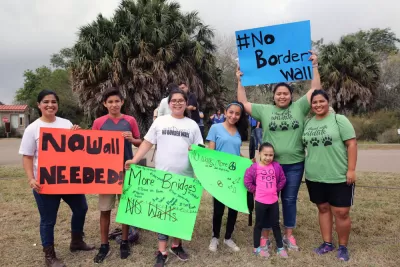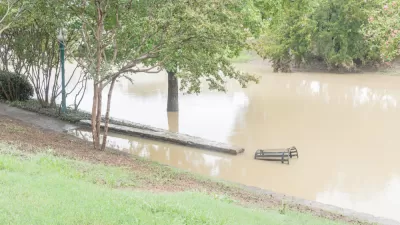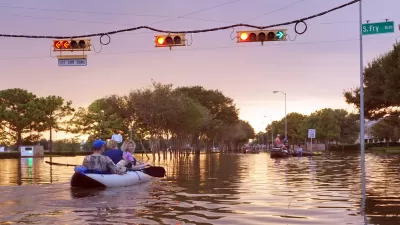The devastation that communities in the Rio Grande Valley face is twofold: the initial destruction of the floods and the cycle of debt and poverty as a result of predatory loans.

The Rio Grande Valley, the southernmost tip of the Texas-Mexico border has made headlines for poverty, immigration and, more recently, the outsized impact of COVID-19 on an already vulnerable population. What is more rarely discussed, however, are the systemic issues at play that mire the Rio Grande Valley, and particularly the informal settlements known as colonias, in a cycle of destruction from which it is difficult to break free. These systemic issues include vulnerability to environmental hazards, especially flooding, ignorance (or apathy) on the part of the federal government, and a model of housing rehab finance that harms those that desperately need support.
In December 2019, I collaborated with local nonprofit organizations as part of my master’s thesis research. I facilitated focus groups and conducted interviews with those who had suffered from floods in the colonias of the Rio Grande Valley. Colonias are informal communities along the U.S.-Mexico border characterized by high poverty rates, low-quality housing and little public infrastructure. These communities are often developed illegally by predatory housing developers that build on semi-rural land in floodplains and the people who live in them are overwhelmingly Mexican and Mexican American.
Historically, colonias developed in the 1980s and ’90s as an affordable way for low-income families to buy land outside of large border cities; now, colonias continue to develop as population pressures increase the cost of housing along the border. The vast majority of colonias are in Texas, and the Rio Grande Valley is home to thousands of them. My research reveals an interconnected system of marginalization in which families, seeking to repair and replace flood-damaged property, turn toward predatory lenders, including payday lenders and car title lenders. As a consequence of these small yet high-interest loans, families are unable to fully recover from these all-too-common floods. This forces many to prioritize bare necessities over repairs. The damaged and destroyed homes commonly produce negative public health effects.
How is this possible?
Left Behind in the Floods
The unique experience of flooding in the Rio Grande Valley is a combination of environmental racism, failed policy, and a financial system that excludes the poor. Indeed, flooding isn’t uncommon, especially in the era of a rapidly changing climate. I spoke with almost 40 individuals and families across the Rio Grande Valley, from whom I learned that they not only experience flooding seasonally, but that the flooding is becoming worse. Unfortunately, there is very little ...
FULL STORY: Flooded: How Natural Disasters Lead to Predatory Lending in the Rio Grande Valley

Planetizen Federal Action Tracker
A weekly monitor of how Trump’s orders and actions are impacting planners and planning in America.

Map: Where Senate Republicans Want to Sell Your Public Lands
For public land advocates, the Senate Republicans’ proposal to sell millions of acres of public land in the West is “the biggest fight of their careers.”

Restaurant Patios Were a Pandemic Win — Why Were They so Hard to Keep?
Social distancing requirements and changes in travel patterns prompted cities to pilot new uses for street and sidewalk space. Then it got complicated.

Platform Pilsner: Vancouver Transit Agency Releases... a Beer?
TransLink will receive a portion of every sale of the four-pack.

Toronto Weighs Cheaper Transit, Parking Hikes for Major Events
Special event rates would take effect during large festivals, sports games and concerts to ‘discourage driving, manage congestion and free up space for transit.”

Berlin to Consider Car-Free Zone Larger Than Manhattan
The area bound by the 22-mile Ringbahn would still allow 12 uses of a private automobile per year per person, and several other exemptions.
Urban Design for Planners 1: Software Tools
This six-course series explores essential urban design concepts using open source software and equips planners with the tools they need to participate fully in the urban design process.
Planning for Universal Design
Learn the tools for implementing Universal Design in planning regulations.
Heyer Gruel & Associates PA
JM Goldson LLC
Custer County Colorado
City of Camden Redevelopment Agency
City of Astoria
Transportation Research & Education Center (TREC) at Portland State University
Camden Redevelopment Agency
City of Claremont
Municipality of Princeton (NJ)





























